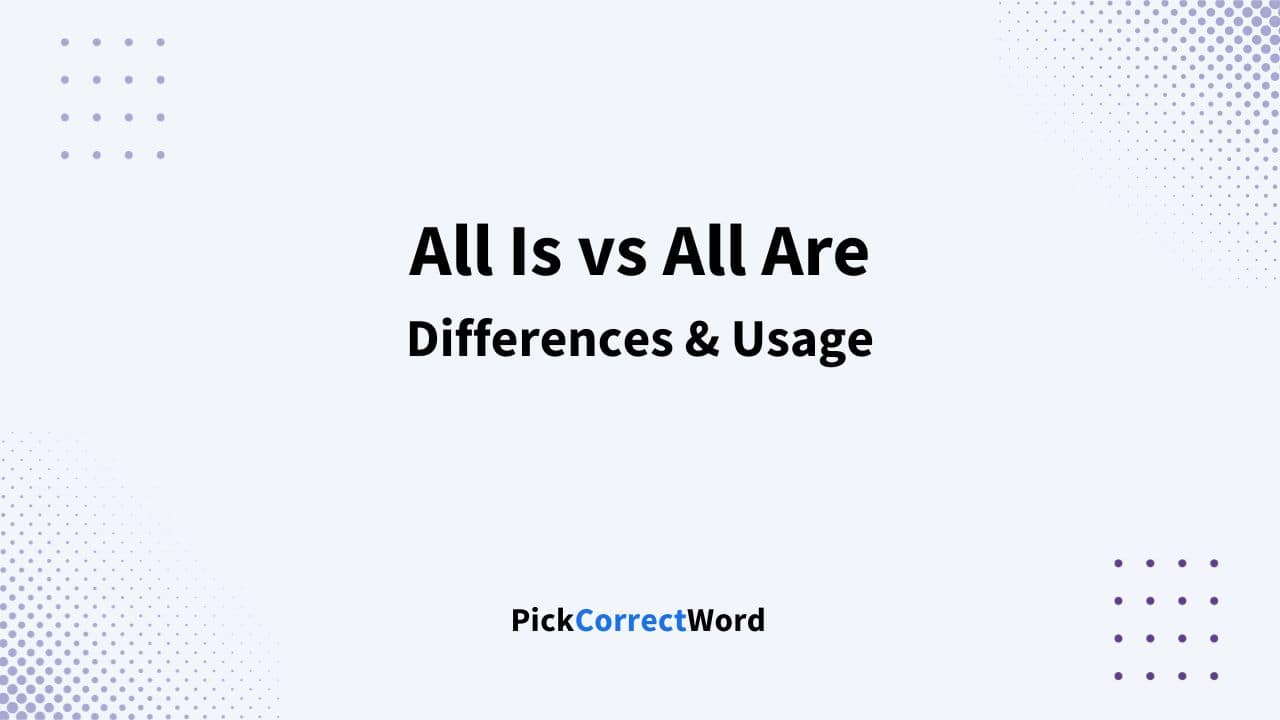It can be hard to understand the difference between all is vs. all are, especially if you are new to the English language. But don’t worry —we’ll teach you the right way to use these phrases in a way that’s simple and easy to understand.
In English, both all is and all are can be used. It depends on the sentence.
“All is” is used to talk about a single, unified whole, while “all are” is used to talk about more than one thing or person. Keeping this simple rule in mind will help you use these phrases correctly in different situations.
All is or all are: What is the correct usage?
The simple answer is that both “all is” and “all are” can be correct, depending on the usage.
The short answer is that both can be right in some situations.
The important thing is to figure out what kind of noun comes after “all” and change the verb to fit either the singular or plural form. Remember this, and it will be easy for you to learn how to use “all is” and “all are.”
All is vs. all are: Difference in Usage
Let’s look into the details of when and how to use each expression.
‘All’ as a Predeterminer
‘All’ is a word called a predeterminer. It’s used before other determiners and a noun to give more emphasis or indicate the whole of a particular group or thing.
In English, ‘all’ has a flexible nature and can correspond to both singular and plural nouns.
Singular Nouns and ‘All’
When ‘all’ is used with a singular noun, we would use “all is.” A simple example would be:
- All is well.
In this case, “well” means everything is right, and we treat the entire situation as one single entity.
Plural Nouns and Agreement with ‘All’
Conversely, when ‘all’ is used before a plural noun, we would use “all are.” Here is an example:
- All the dogs are barking.
Here, “dogs” is a plural noun, and thus, “all are” applies since we are referring to multiple individual dogs.
When to Use ‘All Is’
You can use “all is” when:
- Referring to a whole or an entire group as a single entity. For example:
All is calm in the city tonight
All is included in the tour package.
- Using idiomatic expressions. For example:
All is fair in love and war.
All is right with the world.
When to use ‘All Are’
Use “all are” when:
- Referring to multiple entities individually. For example:
All are welcome to join the community meeting.
All the cookies are baked to perfection.
- The noun following ‘all’ is plural. For example:
All the children are playing.
All the flowers are blooming
Examples of using All is in a sentence
“All is quiet on the western front.“
“All is silent in the midnight hour.“
“All is in place for the surprise party.“
“All is serene in the garden at dawn.“
“All is at rest in the countryside.“
“All is lost if we do not act now.“
“All is calm as the snow falls gently.“
“All is forgiven after their heartfelt apology.“
“All is right with the world.“
“All is well that ends well.“
Examples of using All are in a sentence
“All are required to submit their assignments by Friday.“
“All the paintings are displayed in the gallery.“
“All the students are expected to attend the lecture.“
“All the candidates are qualified for the position.“
“All the books are arranged on the shelf by genre.“
“All the devices are fully charged and ready to use.“
“All the members are contributing to the project.“
“All are invited to the annual company picnic.“
“All the ingredients are mixed into the batter.“
“All the athletes are prepared for the competition.“
All is or all are: US vs UK English
When dealing with grammar rules and trying to determine whether to use “all is” or “all are,” it’s essential to understand that US and UK English have some differences in grammar usage.
There might be instances when the same noun has different plural forms in UK and US English. This can affect the usage of “all is” or “all are.”
For instance, in some cases, British English might treat a collective noun as plural, while American English may use a singular verb.
An example is “team.”
In American English, you may find “the team is winning,”
In British English, one might prefer “the team are winning.”
In summary, when deciding whether to use “all is” or “all are,” focus on the general rule concerning singular and plural nouns and consider between American and British English.
Frequently Asked Questions
How do you determine when to use ‘is correct’ versus ‘are correct’ in a sentence?
To decide whether to use “is correct” or “are correct,” consider the subject noun in the sentence. If it is singular, use “is.” If it is plural or there is more than one noun, use “are.” For example, if the noun is singular, use “is”. If it is plural or there is more than one noun, use “are.”
Is ‘all is invited’ or ‘all are invited’ correct when extending an invitation to a group?
In this context, use “all are invited” since “all” refers to a group of people, which is plural. The correct phrase would be “All are invited.”
Should one use ‘all is good’ or ‘all are good’ to express collective well-being?
In this case, “all is good” would be the appropriate choice. The term “all” can be used to represent a collective state, making it a singular noun. So, “all is good” conveys the intended meaning of overall well-being.


